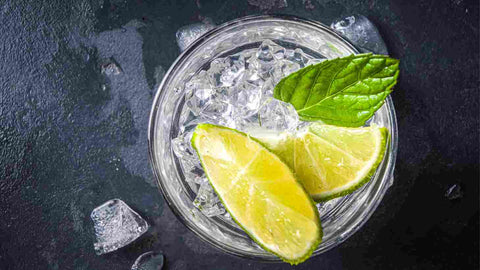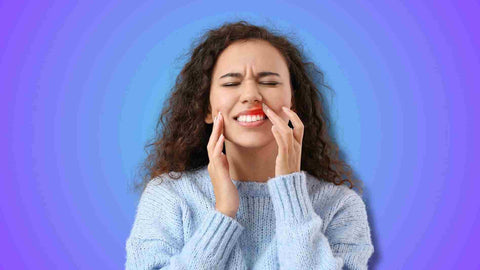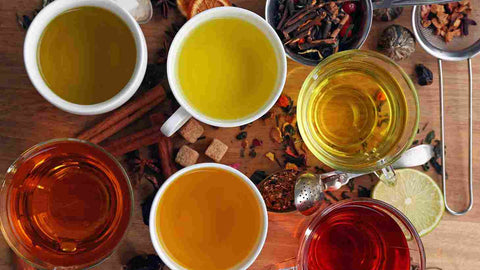Is Vodka Bad for Your Teeth?
Yes, vodka, like other alcoholic beverages, is generally bad for your teeth, but its impact might differ slightly due to its distinct characteristics.
Being a high-proof alcohol and typically consumed in smaller quantities than beer or wine, vodka's direct effects on your teeth may be less about sugar content (since it's generally low in sugar) and more about its alcohol content and acidity.
The high alcohol content in vodka can contribute to dry mouth, a condition where saliva production is reduced. Saliva is essential for neutralizing acids in our mouth and remineralizing tooth enamel, a process we need to prevent tooth decay.
Therefore, a decrease in saliva can increase your risk of tooth decay and gum disease because your mouth's natural defense mechanism against bacteria is compromised. Additionally, the acidity of vodka, while not as high as some wines or mixed drinks, can still pose a risk for enamel erosion over time, making your teeth more susceptible to decay and sensitivity.
To mitigate the potential negative effects of vodka on your oral health, it's important to moderate alcohol consumption and stay hydrated by drinking plenty of water alongside alcoholic beverages. You can also try chewing sugar free gum with xylitol and regularly brush your teeth with remineralizing toothpaste after you drink alcohol.
In this article, I'll explain everything you need to know about vodka, and alcohol more generally, and your teeth.
In general, is alcohol bad for our teeth?

Yes, alcohol is generally bad for our teeth, primarily due to its sugar content, acidity, and the way it affects saliva production.
When you indulge in alcoholic beverages, especially those high in sugar, you're essentially feeding the harmful bacteria in your mouth. These bacteria then produce acids that attack the enamel on your teeth, leading to cavities.
To exacerbate the issue, the inherent acidity of many alcoholic drinks can further erode your tooth enamel over time. This erosion not only makes your teeth more vulnerable to decay but also increases sensitivity, making your favorite hot or cold foods and drinks less enjoyable.
Beyond alcoholic beverages, you may also experience this acidic erosion due to drinks like coffee and tea.
Additionally, alcohol consumption often leads to a dry mouth by reducing saliva flow. Saliva plays a crucial role in your oral health, helping to neutralize acids, wash away food particles, and aid in the remineralization of your teeth.
Without sufficient saliva, your risk for tooth decay and gum disease increases significantly.
To protect your teeth while still enjoying the occasional drink, it's important to stay hydrated by drinking water alongside your alcoholic beverages. Also, you should maintain a consistent and thorough oral hygiene routine including brushing with nano hydroxyapatite toothpaste, tongue scraping, and flossing with expandable dental floss daily.
How does alcohol affect our oral health?

Whether through isopropyl alcohol or ethyl alcohol, alcohol consumption can have several negative effects on oral health, impacting everything from your teeth to your gums and the overall balance of your mouth's ecosystem. Let's walk through some of the key effects of alcohol.
Dry Mouth
Alcohol has a diuretic effect, which can lead to dehydration and a reduction in saliva production. Saliva is crucial for neutralizing acids in the mouth, washing away food particles, and preventing decay.
Therefore, a dry mouth environment is more conducive to bacterial growth, increasing your risk of tooth decay and gum disease.
Tooth Decay and Gum Disease

Many alcoholic beverages contain high levels of sugar which contributes to tooth decay by feeding the harmful bacteria in your mouth.
Further, the acidic nature of some drinks can also erode tooth enamel, making teeth more susceptible to decay.
Additionally, alcohol's impact on saliva production can affect the health of your gums, potentially leading to gum disease, as a dry mouth supports the conditions in which harmful bacteria thrive.
Oral Cancer Risk
Regular and excessive alcohol consumption is a known risk factor for oral cancer.
The risk increases significantly for those who both smoke and drink, as alcohol can make the oral tissues more susceptible to the harmful effects of tobacco.
Staining
Certain alcoholic drinks, like red wine, can stain teeth due to their color pigments (chromogens) and acidity, which etches the teeth and makes them more prone to staining.
Which alcoholic beverages are the worst for oral health?

Certain alcoholic beverages pose more significant risks to oral health than others, primarily due to their sugar content, acidity, and coloring agents. Let's walk through some of worst offenders.
Sweet Mixed Drinks and Cocktails
We all know sugary drinks are not the best for maintaining healthy teeth. These are often loaded with sugar, which feeds the harmful bacteria in your mouth. The bacteria produce acid as they digest the sugar, leading to tooth decay and cavities. Additionally, the acidic mixers used in cocktails can contribute to enamel erosion.
Fruit Wines and Sweet Wines
Like sweet mixed drinks, fruit wines and sweet wines contain high levels of sugar, increasing the risk of tooth decay. Their acidity can also accelerate enamel erosion, making teeth more susceptible to sensitivity and decay.
Fortified Wines
Fortified wines, such as port and sherry, have higher sugar content than regular wines, posing similar risks for tooth decay and enamel erosion due to their sweetness and acidity.
Dark-Colored Beverages
Red wine, dark beers, and certain spirits mixed with dark-colored sodas can cause staining of the teeth. Red wine, in particular, is known for its tannins and chromogens, which adhere to the enamel and lead to discoloration. While not directly impacting tooth health, these stains can affect the appearance of your smile.
Alcoholic Beverages with High Acidity
Besides their sugar content, drinks like white wine and some beers have high acidity levels. This acidity can weaken and erode tooth enamel over time, increasing the risk of decay and making teeth more sensitive.
Frequently Asked Questions
What alcohol is least damaging to teeth?
When it comes to choosing alcoholic beverages that are least damaging to teeth, opt for those with lower acidity and sugar content. Lighter-colored drinks like vodka or gin mixed with water or soda are generally better choices as they are less likely to erode tooth enamel compared to darker spirits or sugary cocktails. However, it's essential to consume alcohol in moderation and maintain good oral hygiene practices to minimize any potential negative effects on dental health.
Is vodka corrosive to teeth?
The vodka itself is not corrosive to teeth as it doesn't contain sugars or acids that directly damage enamel. However, excessive consumption of alcoholic beverages, including vodka, can lead to dehydration, which reduces saliva production and increases the risk of tooth decay and gum disease. Additionally, if vodka is mixed with acidic or sugary mixers, it can contribute to enamel erosion and cavities. It's important to drink alcohol in moderation and maintain good oral hygiene habits to protect dental health.
Which alcohol is worse for your teeth?
Alcoholic beverages that are high in sugar content or acidity are generally worse for your teeth. Drinks like sweet cocktails, liqueurs, and mixers with high sugar content can contribute to tooth decay and cavities. Additionally, highly acidic beverages like citrus-flavored cocktails or sour mixers can erode tooth enamel over time. It's important to drink these types of alcohol in moderation and consider rinsing your mouth with water or brushing your teeth afterward to minimize their potential negative effects on dental health.
Do you need to brush your teeth after drinking vodka?
Brushing your teeth after drinking vodka isn't strictly necessary if it's consumed neat or with a non-sugary mixer, as vodka itself doesn't contain sugars that feed oral bacteria or acids that erode enamel. However, it's generally a good idea to maintain oral hygiene after consuming any alcoholic beverages to counteract the drying effect alcohol has on the mouth, which reduces saliva flow and can increase the risk of tooth decay and gum disease. If you do decide to brush, it's wise to wait at least 30 minutes after drinking, especially if you've consumed acidic mixers, to avoid brushing the acids into the tooth enamel.
How can I protect my teeth when drinking alcohol?
To safeguard your teeth while consuming alcohol, opt for drinks lower in sugar and acidity. Hydrate with water alongside alcoholic beverages to rinse away sugars and acids and counteract dry mouth. Consider using a straw to minimize contact with teeth when drinking acidic or sugary cocktails. Wait at least 30 minutes after consuming acidic drinks before brushing your teeth to prevent enamel erosion, and maintain regular oral hygiene practices like brushing and flossing.
Is vodka bad for your gums?
The vodka itself doesn't directly harm gums, as it doesn't contain sugars or acids that promote gum disease. However, excessive alcohol consumption, including vodka, can lead to dehydration, reducing saliva production and increasing the risk of gum problems. Additionally, if vodka is consumed with sugary mixers or followed by poor oral hygiene practices, it can indirectly contribute to gum disease. Moderation and good oral hygiene habits are key to minimizing any potential negative effects on gum health.






















